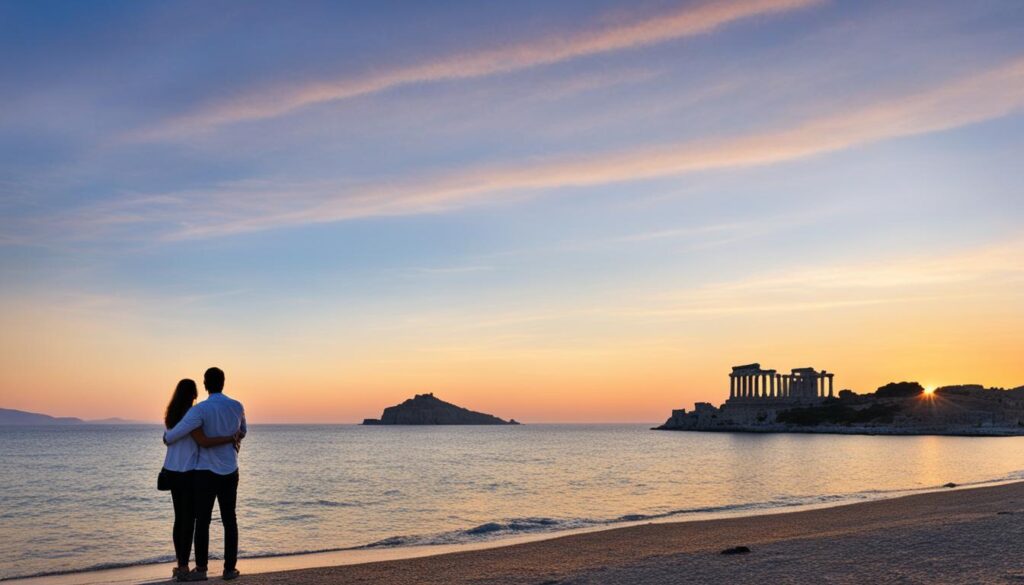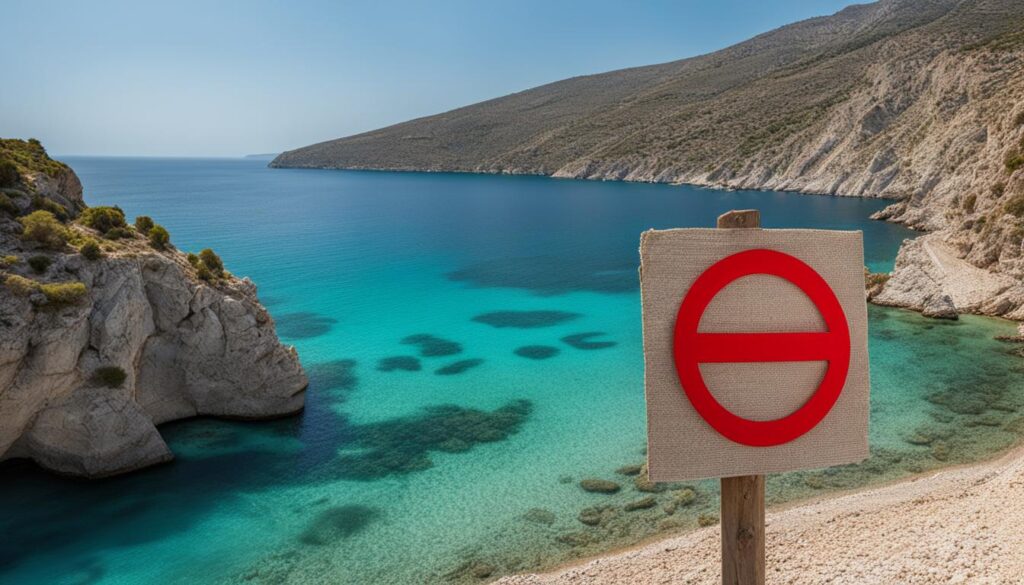Planning a trip to Greece? Amidst the stunning scenery, rich history, and delicious cuisine, you may be wondering, “is Greece safe to travel to?” This article will provide you with essential safety tips to ensure your trip is enjoyable and secure. From navigating busy city streets to enjoying quiet island beaches, we will cover everything you need to know to ensure a safe and unforgettable visit to Greece.
Current Travel Safety Situation in Greece
Before embarking on your journey to Greece, it is important to be informed about the current travel safety situation in the country. While Greece is generally considered safe for travelers, there are certain risks and concerns that you should be aware of.
As of the date of publication of this article, Greece has a low risk of terrorism, violent crime, and petty theft. However, there have been reports of pickpocketing and theft in crowded tourist areas, so it is best to be cautious with your belongings and avoid displaying them in public.
Additionally, demonstrations and protests can occur in Greece, especially in Athens, which could lead to road closures, transportation disruptions, and clashes with police. If you encounter such situations, it is best to avoid confrontations and find a safe place to wait until the situation is resolved.
It is also worth noting that Greece is situated in a seismically active region, which means that earthquakes and tsunamis can occur. Make sure to follow any safety procedures or evacuation orders in the event of a natural disaster.
Before traveling to Greece, it is recommended to consult with a travel risk assessment service to evaluate any specific risks or concerns and to take appropriate precautions to ensure your safety throughout your visit.
Government Travel Advisories for Greece
If you’re planning a trip to Greece, it’s important to stay informed about the latest government travel advisories. The US Department of State issues regular updates on safety and security concerns and provides recommendations for travelers. It’s essential to be aware of any travel restrictions, local laws, and customs that may affect your trip.
As of the latest update, the US Department of State has issued a Level 3: Reconsider Travel advisory for Greece due to the COVID-19 pandemic. Travelers are advised to follow all COVID-19 related guidelines and restrictions in Greece, including testing requirements and vaccination status.
Additionally, while Greece is relatively safe for travelers, precautionary measures should be taken to ensure a safe and enjoyable trip. Avoid carrying large amounts of cash, keep valuables secured and out of sight, and be aware of your surroundings.
Greece Travel Advisory Levels
| Level | Advisory | Description |
|---|---|---|
| Level 1 | Exercise Normal Precautions | There are no known security or safety concerns. |
| Level 2 | Exercise Increased Caution | There may be heightened risks to safety and security. |
| Level 3 | Reconsider Travel | There are serious safety and security concerns that could put travelers at risk. |
| Level 4 | Do Not Travel | Travelers should not travel to this location due to extreme safety and security risks. |
It’s crucial to check for updates before and during your trip to Greece, as travel advisories can change based on various factors such as political unrest, natural disasters, and other unforeseen events. By staying informed and taking necessary precautions, you can have a safe and memorable trip to Greece.
Safety Tips for Exploring Greek Cities
While exploring the vibrant cities of Greece, it’s essential to take certain precautions to ensure your safety. Follow these Greece travel safety tips to stay safe:
Transportation Safety
When traveling around the city, use reputable taxis or public transportation. Avoid accepting rides from strangers, and be cautious when walking on busy streets. If you’re driving, be aware of the narrow, winding roads and refrain from speeding.
Personal Belongings
Keep your valuables, such as cameras, wallets, and passports, secure at all times. Avoid carrying all your money in one place, and be particularly cautious in crowded areas where pickpockets may be present.
| Do: | Keep your bags and backpacks in front of your body. |
|---|---|
| Don’t: | Leave your belongings unattended or forget to secure your valuables. |
Cultural Norms
Respect the local culture and customs, dress appropriately, and avoid confrontations with locals. Some areas may have specific rules and practices, such as removing your shoes before entering a home or place of worship.
Emergency Preparedness
Keep emergency contact information and your passport in a safe place. Familiarize yourself with the location of the nearest embassy or consulate and any emergency services in the area.
Remember, staying safe in Greece requires being aware of your surroundings and taking appropriate precautions. Following these tips will help you stay safe and enjoy a memorable trip.
Staying Safe on Greek Islands
While the Greek islands offer stunning beaches and water activities like snorkeling and scuba diving, it’s important to take precautions to ensure your safety.
When swimming in the sea, always be aware of strong currents and avoid swimming alone. Stick to designated swimming areas and pay attention to any warning flags that indicate dangerous conditions. Keep in mind that beaches with fewer people may have weaker safety infrastructure, so exercise extra caution in remote or less-populated areas.
It’s also recommended to wear water shoes to protect your feet from sea urchins or other sea creatures and to apply sunscreen frequently to avoid sunburn.
When exploring the islands, be mindful of personal belongings and avoid displaying wealth or carrying large amounts of cash. Use a hotel safe to store important documents like passports, and keep a photocopy of these documents with you at all times.
Remember that emergency services may be limited on some islands, so it’s a good idea to research medical facilities and services before your trip. It’s also worth considering travel insurance that covers emergency medical treatment and evacuation.
In summary, the Greek islands offer a unique and captivating travel experience, but it’s important to prioritize your safety and take necessary precautions while enjoying all that they have to offer.
Health and Medical Considerations in Greece
When traveling to Greece, it’s crucial to be prepared for any health or medical concerns that may arise during your trip. Here are some safety precautions to ensure a healthy and happy journey:
| Health Concern | Safety Precaution |
|---|---|
| Vaccinations | Check with your healthcare provider for any recommended vaccinations before traveling to Greece. |
| Prescription Medications | Carry your prescription medications in their original containers, along with a copy of your prescription. |
| Health Insurance | Ensure you have adequate health insurance that covers any medical expenses while in Greece. |
| Emergency Contact Information | Save emergency contact information, including the local embassy and your insurer’s emergency contact, on your phone and carry a written copy with you. |
| Water | Avoid drinking tap water and only use bottled water for drinking and brushing teeth. |
| Food Safety | Be cautious with street food, ensure food is cooked properly, and practice good hand hygiene to prevent foodborne illnesses. |
In case of a medical emergency, dial 112 for assistance.
By taking the necessary safety precautions, you can enjoy your time in Greece without worrying about potential health or medical concerns that could affect your trip.
Natural Disasters and Weather Safety in Greece
When traveling to Greece, it’s essential to be aware of the natural disasters and weather patterns that can occur so that you can prepare accordingly and have a safe trip.
Greece is known for its sunny and warm climate, but it’s important to remember that temperatures can reach high levels during the summer months, so it’s recommended to stay hydrated and avoid any strenuous activities during the hottest hours of the day. In addition, pay attention to weather forecasts and advisories during your stay, especially during the winter months, as Greece can experience heavy rain, snowstorms, and even floods in certain areas.
When it comes to natural disasters, earthquakes are the most common in Greece, so it’s important to know what to do in case of an earthquake. Find the nearest exit or safe spot and stay there until the shaking stops. If you’re inside a building, avoid using elevators and stay away from windows, objects that may fall, or structures that can collapse.
Tip for staying safe: Familiarize yourself with the emergency procedures and evacuation plans of your accommodation and any areas you plan to visit. Always carry an emergency kit that includes essential items such as a first-aid kit, portable charger, flashlight, and a fully charged mobile phone.
“The most important thing when traveling to Greece is to stay updated with weather reports and any government advisories regarding safety in the area you’re visiting”
Cultural and Social Etiquette in Greece
It’s essential to be aware of Greek cultural and social etiquette when traveling to Greece. By respecting local customs and traditions, you can have a safe and enjoyable trip while forming meaningful connections with locals. Here are some tips to keep in mind:
Greetings
When meeting someone in Greece, it’s customary to offer a polite greeting. This often involves a handshake, accompanied by direct eye contact and a friendly smile. Greeks often use formal titles when addressing others, such as “Kyrie” (Mr.) or “Kyria” (Mrs.), followed by the person’s last name.
Dress Code
Greeks value modesty in dress, especially in religious sites or formal settings. It’s recommended to dress conservatively, covering shoulders and knees, and avoiding clothing that’s too revealing or provocative.
Mealtime Customs
Food is an essential aspect of Greek culture, and mealtimes are often social events. It’s customary to greet others at the table and express gratitude before beginning to eat. When you’re finished eating, it’s polite to thank your hosts once again.
Public Behavior
Greeks value politeness and respect in public settings. It’s common to say “excuse me” (“signomi”) when bumping into someone or cutting through a line. Avoid raising your voice or getting into confrontations, as it can be considered disrespectful.
By following these cultural and social etiquette tips, you can ensure a safe and respectful experience while traveling in Greece.
Conclusion
As a final reminder, it’s vital to prioritize safety when traveling to Greece. Keep in mind the essential safety tips we covered, and familiarize yourself with the current travel safety situation in Greece.
Make sure to monitor the government travel advisories for any updates or changes and take any necessary precautions. Remember to respect the local culture and follow cultural and social etiquette.
By staying informed and aware, you can ensure a safe and unforgettable trip to Greece. Enjoy the beautiful scenery, delicious food, and rich history with the peace of mind that comes with prioritizing Greece travel safety.

















































